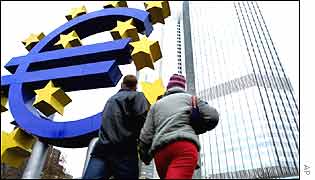| You are in: UK: Politics | ||||||||||||||||||||||||||||||||||||||||||||||||||||||||||||||||||||||||||||||||||||||||||||||||||||||||||||||||||||||||||||||||||||||||||||||||||||||||||||||||||||||||||||||||||||||||||||||||
|
Thursday, 20 February, 2003, 12:08 GMT
Brown dismisses euro reports

The government will rule on the euro by June
Chancellor Gordon Brown has dismissed reports that he has ruled out UK entry to the euro and said a study into the effects of joining the single currency has yet to start.
Speaking on BBC One's Breakfast with Frost, Mr Brown said the euro decision was the most difficult and most important that the UK had faced in economic terms. He said a report in the Sunday Times that he had already rejected euro entry was not true. "The assessment has actually not started," he said. "We are doing a tremendous amount of work. This is the most difficult, the most important economic decision that this country has had to make on economic policy. "We are determined to do it on a rigorous and comprehensive analysis. The assessment itself has not yet started. Positive "The first report of the results will be to the House of Commons and not to a newspaper." A positive assessment of the five economic tests by June would lead to a referendum on joining the euro. But there is speculation at Westminster that the government has decided against holding a poll this year. One theory is that Mr Brown will say before June that the tests - which assess things like the impact of euro entry on jobs and investment in the UK - have not been fully met and that he will look again at them in the autumn. A positive verdict then could lead to a referendum early next year. Other commentators believe, however, that a poll will be delayed until after the next general election. Mr Brown said his assessment of the tests would examine all aspects of the effect of euro entry on the UK economy. The tests will examine the effects of euro entry on trade, the housing market, on business investment, on the capital markets and would also assess the flexibility of the European and UK economies, he said. Mr Brown said 18 studies were being undertaken before assessment of the tests could begin. "The assessment will follow the studies and that of course will happen later. And of course we have until June to make the final decisions. "It will be done by June as we've said all along, it was within two years of the start of the Parliament. Proper "But I don't think people should underestimate the rigour and the comprehensive nature of the work. Mr Brown would not be drawn on what would happen if the assessment of the tests advised against euro entry. "The way forward is to make the assessment, to announce it to the House of Commons and to do it in the proper time," he said. The chancellor said a White Paper on European economic reform calling for more flexibility in the European economy would be published in the next few days. He said the paper would also defend the government's opposition to giving the EU more power on decisions on taxation.
|
See also:
20 Feb 03 | Politics
21 Jan 03 | Business
21 Nov 02 | Politics
05 Dec 02 | Business
20 Feb 03 | Politics
|
||||||||||||||||||||||||||||||||||||||||||||||||||||||||||||||||||||||||||||||||||||||||||||||||||||||||||||||||||||||||||||||||||||||||||||||||||||||||||||||||||||||||||||||||||||||||||||||
|
|
 |
||
| ----------------------------------------------------------------------------------
To BBC Sport>> | To BBC Weather>> | To BBC World Service>> ---------------------------------------------------------------------------------- © MMIII | News Sources | Privacy |